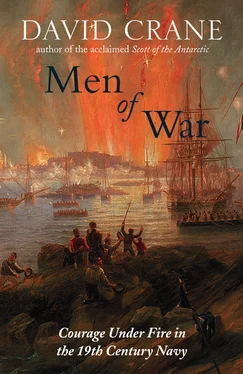The war at sea had been largely turned around by the time Hastings joined the Anaconda , but though he got his fair share of prizes there was still one more brutal lesson before he could quit America. In the first twelve months after he had joined Westphal and the Anaconda he was principally engaged in the West Indies and the Gulf of Mexico, and as the conflict ground to its inevitable and pointless conclusion – the status quo ante , with no gains and no concessions on either side – he found himself at anchor with the main British fleet off the Louisiana coast in support of Britain’s last punitive effort of the war.
If anything can epitomise the uselessness of the conflict, it is the Battle of New Orleans, fought at the beginning of January 1815, two weeks after the peace treaty had been signed at Ghent. For some months before this the opposition to war had been growing in Britain, but the abdication of Napoleon had given the government a belated opportunity to send out an army of Peninsular veterans under the command of Wellington’s brother-in-law, Sir Edward Pakenham, to strengthen its position at the negotiating table.
In the middle of December 1814 the navy began to ferry the army to its advance base on the Île de Poix in Lake Borgne, but from the start the operation was bedevilled by delays – Pakenham had not even arrived – logistical shortages, command failures and overconfidence. After the pusillanimous American performance before Washington that last was at least understandable, yet as so often it was only the courage and endurance of the army’s rank and file that redeemed a battle plan which condemned them to a sixty-mile slog across lake, bayou, bank, shoal, swamp and the mud of a half-cut canal in some of the filthiest weather Louisiana could throw at them.
It had never occurred to Andrew Jackson, in command of New Orleans’s defence, that an attack could come from this quarter, but by December the British army and commander were at last united on a narrow strip of firm ground between the Mississippi on their left flank and a cypress swamp on their right, just seven miles downriver from New Orleans. ‘In the endeavours to place the small vessels of war as near as possible to the point of landing,’ Sir Alexander Cochrane, the Commander-in-Chief, wrote of the Anaconda ’s role in the operation,
Captain Westphal was particularly conspicuous in his zeal and success towards the effecting of this important object; he having, by the utmost perseverance, skill, and exertion, hove the ANACONDA over a bank nearly five miles in extent (upon which there were only eight feet of water), into Lac Borgne, and there occupied a station that enabled that sloop to render the most essential aid and protection to the open boats conveying troops and supplies from the fleet; which were frequently rescued by her assistance from the imminent danger to which they were reduced by the severity of the weather.
With Jackson’s defenders now entrenched behind a strong defensive wall stretching from river to swamp, however, and his right flank supported by the naval guns of the Carolina and Louisiana, Pakenham delayed his final assault until more artillery could be brought up from the fleet. Under the command of Sir Thomas Troubridge, a naval brigade that included Hastings dragged and canoed their cannon up from Lake Borgne, and on 27 December – using the hot shot that would become so dear to Hastings’s heart – set fire to the Carolina and blew her out of the water in a matter of only minutes. ‘His conduct as a Gallant, able, attentive, Obedient, and Zealous young officer, claims my highest approbation,’ Westphal wrote of Hastings’s part in the action. ‘On several occasions his zeel [sic] & activity attracted the notice of Sir Thomas Troubridge, who commanded the Brigade of Seamen and of Lt Col Dixon commanding the artillery, both of whom caused me to express to Lieutenant Hastings (on several occasions) their thanks for his persevering activity, and promptitude in the execution of the several tasks with which he was entrusted.’
The spectacular destruction of the Carolina was the last real British success of the campaign. A humiliating defeat in an artillery duel on 1 January gave a grim pointer to what was to come, but it was a warning wasted on Pakenham. Reinforced by the arrival of two more of Wellington’s best regiments he ordered a frontal assault against the entrenched American line for dawn on the eighth. It was an assault that Hastings and the navy were well out of. The failure of a diversionary attack across the river to go off on time, or an appalling blunder that left the forlorn hope without fascines or scaling ladders, might have deterred another commander, but Pakenham was made of sterner stuff. With the morning light already streaking the Louisiana sky he gave the command for the attack to begin.
The previous day Jackson had watched British preparations for the battle, and as the rocket signal went up, and the fog cleared from the British troops advancing in close order, the turkey shoot began. At five hundred yards the first twelve-pounder exploded into life, followed by the whole of the artillery and – at two hundred yards – by Jackson’s Tennessee riflemen. There was no missing and no escape. The attackers were soldiers who had fought their way up Spain under Wellington, but under the sustained fire of the whole American line the right began to edge left and the British assault to falter. General Gibbs got to within twenty yards of the defences before he fell with four bullets in him. A few even made it as far as the ditch in front of the earthworks before they died. As the troops fell back, they found themselves caught between their own guns behind them and the American in front in a chaotic shambles of their commanders’ making. And for once British troops were not going to bale their generals out. ‘For shame!’ cried Pakenham, trying to rally them again, ‘Remember you are British soldiers!’ but it was no use. As he spurred them on a bullet shattered his knee and brought down his horse. Mounting another, he was immediately hit again in the groin and spine and collapsed to the ground, his last, unavailing orders expiring on his lips with him.
This was the end of the assault, and at just 8 o’clock, and in spite of the eventual success of the diversionary attack, the effective end of the battle. At the cost of eight – or perhaps thirteen – casualties, the Americans had killed two thousand British troops in the most lopsided defeat ever inflicted on British arms. And with the coming of peace there would be no time for redemption. ‘Hoisted the English and American ensign in conjunction,’ reads the Anaconda ’s log for 16 March 1815, ‘& fired a grand salute in commemoration of Peace with America.’
It was a bitter end to a criminally pointless war. And for Hastings it was not just the end of the war but, except for the odd skirmish with Malay pirates in the Far East, the last time he would see action as a Royal Navy officer. Family interest and family money would keep him from the fate of those thousands of lieutenants thrown on the scrapheap by Waterloo, but from now on he would have to go looking for his excitement. ‘I feel that in addressing your Lordship I am taking upon myself an unwarrantable liberty,’ he wrote to Lord Melville, the First Lord of the Admiralty, after sixteen months in the Orlando on the Eastern station and the best part of an uneventful year aboard the Pelican in the West Indies had brought him again to London with his begging bowl out:
perhaps no excuse can easily justify it; I throw myself on your Lordship’s well known clemency and trust that you will not attribute it to impertinence, but an anxiety to attain that eminence in any profession which is the object of every enterprizing officer … this has emboldened me to solicit employment in the expedition which your Lordship may, perhaps, decline, to prosecute their discoveries to the Northward at a favourable season. If I am so happy as to enjoy a place in your lordship’s good opinion, sufficiently favourable to induce you to grant my request, no exertion on my part shall be wanting to qualify myself for this arduous undertaking. Till the period of sailing my labours shall be directed to the acquisition of such knowledge as is likely to prove serviceable – you may perhaps find those more capable but none more devotedly willing to acquit themselves with credit.
Читать дальше











